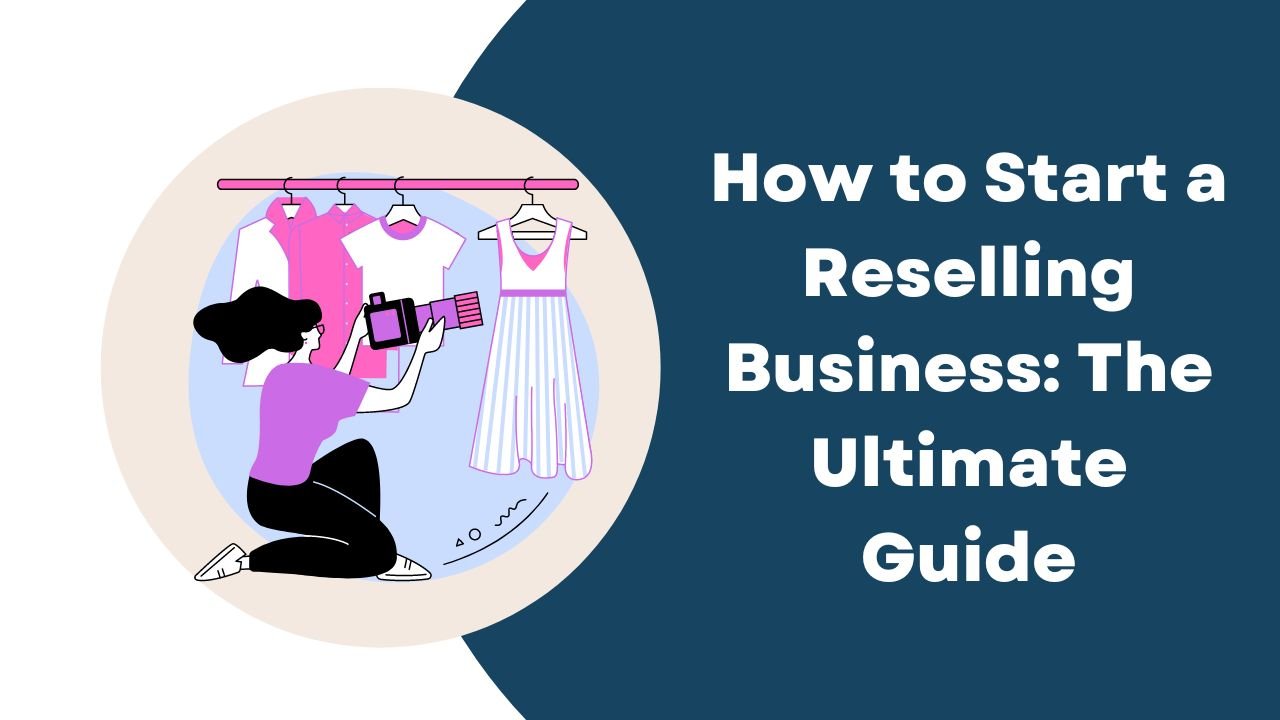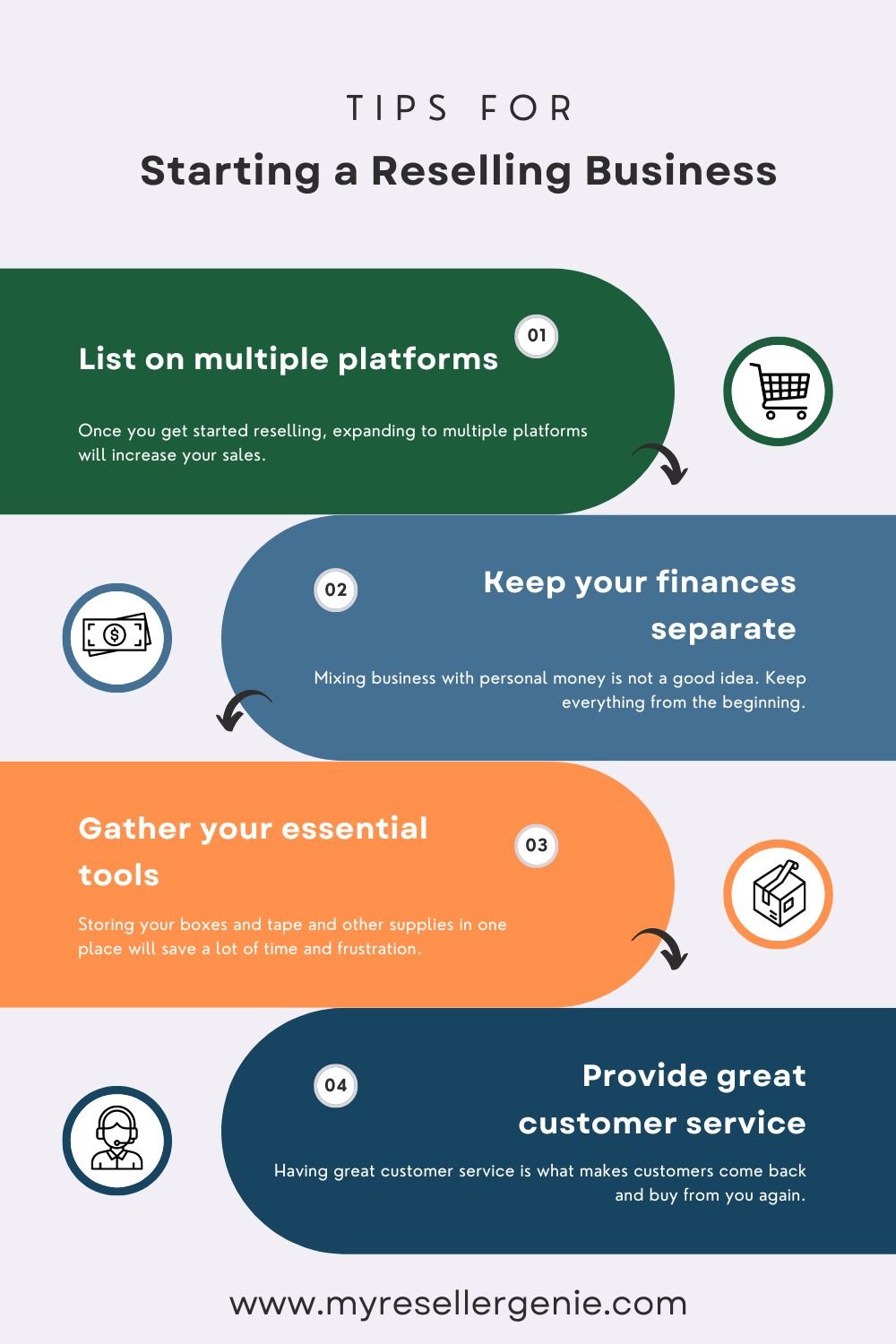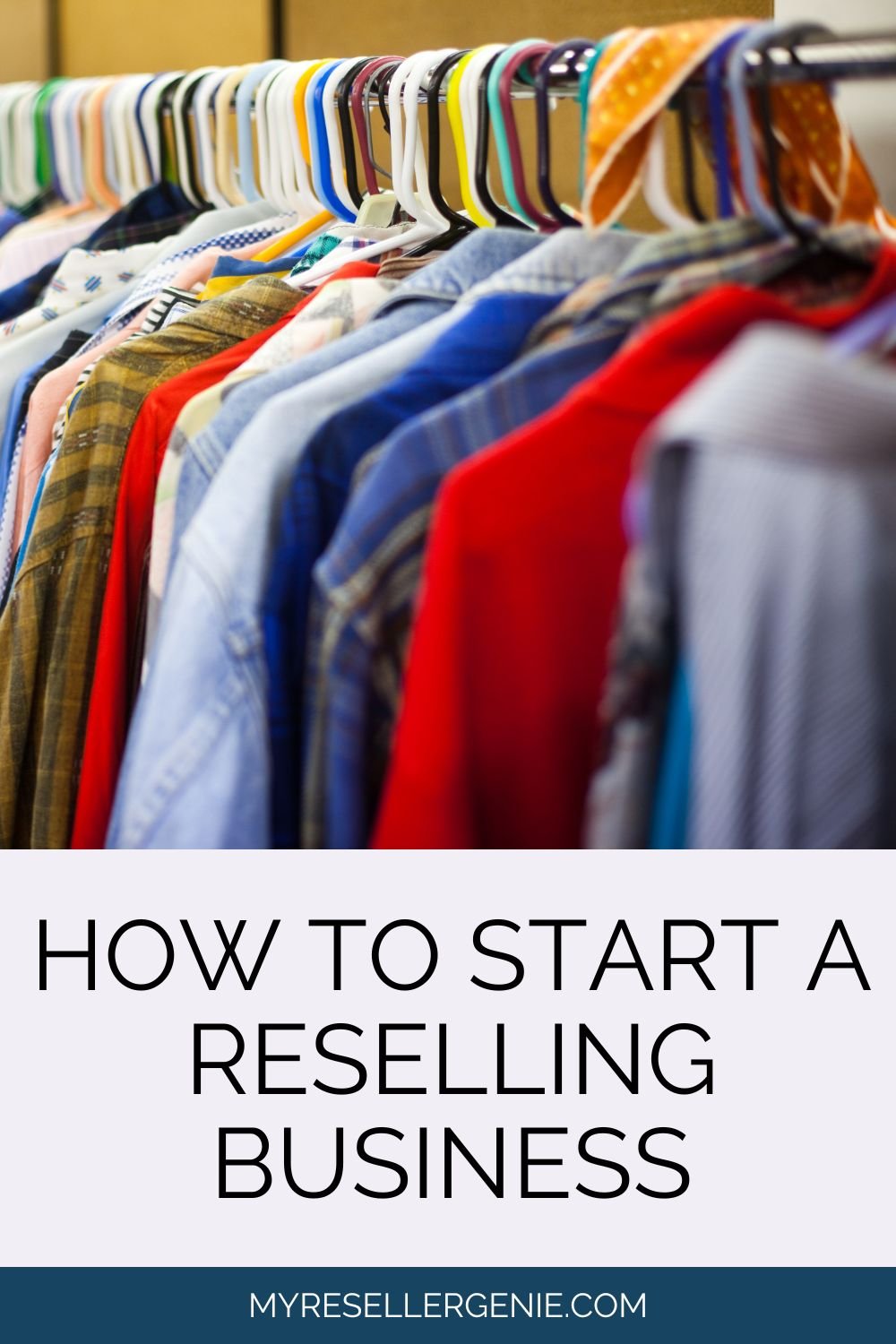How to Start a Reselling Business: The Ultimate Guide
*If you purchase something linked on our site, we may receive a commission. Learn more here.
The resale industry is booming, enticing a new wave of hustlers with marketplaces that champion both sustainability and entrepreneurial innovation. From luxury clothing to collectible sneakers, everyday treasures are being given a second life, and the market is hotter than ever. Starting a reselling business is a great way to have your own ecommerce business without having to drive traffic to your own website.
If you're looking to ride this upward trend and start your own reselling business, you've come to the right place.
This comprehensive guide is designed to help you navigate the exciting world of reselling, from finding high-demand products to delivering top-notch customer service. If you've wanted to become a reseller, this guide is for you.
Sourcing Items to Resell
Finding products to sell in your online store is the first and most pivotal step in the reselling journey. The key is sourcing items that not only have potential for profit but also have a market demand. But where do you start?
Where to Find Products
The beauty of reselling is that you can find products for your reseller business just about anywhere. Thrift stores and yard sales can yield a hidden gem for a fraction of the cost. Estate sales are a particularly rich ground for unique items. Online auctions and marketplaces like eBay or Craigslist extend your reach beyond physical boundaries. Don't discount the power of networking; local buy-and-sell groups or connecting with other business owners or resellers can offer consistent supplies of certain items.
To make this a profitable business venture, buying low dollar items from places like garage sales is the best way to acquire inventory. Thrift stores may be pricier per item. Your money will be made on the buy, meaning that if you overpay, it's going to be very hard to make profit.
Tips for Finding Profitable Items
To maximize your chance of profitability, you need to do the research. Always stay up to date with trends and know what's hot in the resale market. Pay attention to niche markets; they can be less competitive and yield higher margins.
This is where your niche expertise comes in. Is there something you collect or know a lot about? That is a great place to start.
Understanding the value of items can make or break a deal, so invest in price guides or apps that can help you appraise products accurately. When you are just starting out, use the eBay app or the app for the marketplace you're selling on. Learn how to filter search results in the app by sold listings.
After you get more experience, you may want to search for websites or apps specific to your niche, like PriceCharting for video games.
Related post: How to Master Online Sourcing for Resellers
Opening a Business Bank Account
While you can technically start a reselling venture without opening a business-specific bank account, it's highly recommended for tax and organization purposes. Mixing personal and business funds can make it difficult to track revenue and expenses for accurate reporting, and increases the risk of financial errors.
When choosing a bank account, consider fees, accessibility (online banking options), rewards programs (cash-back or mileage), and any special perks for small businesses. Consult with a financial advisor to determine the best fit for your specific business needs.
Often, a personal checking account at a credit union or smaller bank is easiest because there are rarely monthly fees for these types of accounts. It doesn't have to be an actual business account to serve its purpose. The important part is keeping your business finances separate from your personal accounts.
Creating a Bookkeeping System for your Reselling Business
It’s important to not only have a separate business checking account, but to also have a system for bookkeeping. Whether you use a spreadsheet or a software program like My Reseller Genie, tracking current inventory, sales, expenses and fees is very important.
Related post: Ultimate Guide to Bookkeeping for Resellers
Reselling Platforms
Understanding the landscape of reselling platforms can help you choose the best fit for your business. Each platform has a different customer base and purpose.
Overview of Popular Reselling Platforms
eBay is a classic go-to for resellers, offering a variety of item categories and an auction feature. Poshmark is great for fashion items and fosters a social selling environment. Amazon is particularly good for reselling books, electronics, and other consumer goods. Each platform has its unique features and audience, so it's important to do your market research and understand the platform’s policies.
Related post: Reselling on eBay: 24 Mistakes New eBay Sellers Make
Pros and Cons of Each Platform
eBay's expansive user base and ability to reach international buyers are big pluses. Poshmark's user-friendly platform and community engagement can be a strong draw for sellers focused on fashion. Amazon's FBA program can quicken sales, but its strict seller guidelines and fees must be considered.
Listing on Multiple Platforms
Simply finding a product isn't enough. To capture the widest customer base, you should consider multi-platform selling. Why create one online store when you can create multiple stores to sell items to a wider audience?
Be sure to learn one platform well before adding more or you will be overwhelmed.
Importance of Multi-Platform Selling
Listing your items on multiple platforms, such as eBay, Poshmark, or Amazon, can increase your visibility and chances of making a sale. Different platforms attract different types of buyers, so by diversifying, you're more likely to reach your ideal market.
Best Practices for Listing Items
When creating your listings, take high-quality photos and provide detailed descriptions. Transparency is key — document any imperfections and include all relevant information such as size, material, and condition. Pricing competitively and maintaining consistency across platforms will build trust with your customers.
Basic Tools & Supplies Needed
Every business needs tools, and reselling is no different. Here's what you need to get started.
Essential Equipment for a Reselling Business
You don't need a lot to start reselling. Gather a few basic items to start. You probably have most of what you need around the house already.
a smartphone to take photos/list
boxes
bubble mailers
paper and packing tape or half-sheet labels
Use recycled items in the beginning if you can. This will help you save money to be able to invest it back into your online resale business. You might think that it’s difficult to find supplies for a business where most people sell one-off items, but it can be easier than you think.
Recommended Resources for Resellers
There are numerous resources to help you streamline your reselling business. A bookkeeping tool, like My Reseller Genie, will aid in managing finances. Cross listing software like List Perfectly will help you cross list items to other selling platforms.
Storing Listed Inventory
Control over your inventory can make or break your business. Your storage method should be efficient and organized. Canceling orders because you can’t find sold orders will negatively affect your seller accounts.
Strategies for Organizing and Managing Inventory
Categorize your inventory by item type, season, or any other relevant criteria. Implement a system that allows for easy retrieval when an item sells. Consider using clear bins or shelves to maintain visibility and accessibility.
Inventory Organization Basics:
Tips for Efficient Storage Solutions
If you're short on space, consider renting a storage unit or converting a spare room into a warehouse. Vertical storage systems, like shelves and hanging racks, can maximize space. Whatever method you choose, ensuring items are stored in a clean, dry, and safe environment is non-negotiable.
Providing Great Customer Service
In the reselling world, customer service is just as important as the product itself.
The Importance of Excellent Customer Service in Reselling
High-quality service builds trust with your customers and can lead to repeat business. Respond quickly to any inquiries, process orders promptly, and handle returns and refunds with grace.
Best Practices for Handling Customer Inquiries and Issues
Educate yourself on the platform's policies and stay informed on best practices for dispute resolution. Use customer feedback as a learning opportunity to improve your business.
Think of a few common scenarios, especially with returns, and with that platform’s policies in mind, create a script to guide you in your response. Remember, do not take this personally and do not let your emotions get thrown into the mix. It’s business. Handle it according to the platform’s policies.
How to Choose a Profitable Business Model
There are a variety of business models to choose from when it comes to reselling. The right one for you will depend on your budget, resources, and interests. Is being a reseller profitable? Yes, if you structure your business in a way that best works for you.
Popular Business Models in Reselling
Buying in bulk includes purchasing large lots of new or used goods from places like the Goodwill Outlet Store, auctions, liquidations pallets, or other resellers. Retail arbitrage is buying discounted or even full price items from retail stores and reselling them at a higher price. Wholesaling involves purchasing products in bulk from manufacturers at a lower cost and reselling them to retailers or consumers.
You can also purchase wholesale lots from other resellers or from private estate picks. This will take some effort on your part as far as networking goes, but it will pay off.
Factors to Consider When Choosing Your Resale Business Model
Your budget, available storage space, and desired level of involvement will influence which business model is best for you. Research each model and consider the time, effort, and resources needed for each before making a decision. Remember, your business model can always evolve as your business grows and changes.
Common Questions
What is a resale business?
A resale business involves purchasing products from a source and reselling them at a higher price to customers. This can include sourcing items from retail stores, liquidation sales, or wholesalers and then selling them through various platforms such as eBay, Poshmark, or Amazon.
The goal is to make a profit by finding valuable items and selling them for a higher value. Some resellers also choose to create their own brand and private label products for resale.
Is reselling a profitable business?
Reselling offers a flexible way of starting a business. Reselling is your chance at a profitable business with very little upfront cost. Start by selling things around your home to see if you enjoy it. Then move on to items that you can purchase at garage sales, thrift stores, and anywhere else something is for sale.
There can be much larger profit margins with reselling than there is with a traditional retail store model. Lowering buy cost and raising average sale price should be a goal.
Can I start reselling with no money?
Yes, you can start reselling with no money by selling items you have around your home. This means you won't need to invest in inventory upfront and can instead focus on building your business.
However, it's important to budget for tools and supplies that will help streamline your business, such as a camera, smartphone, and packaging materials. So while technically you don't need money to start reselling, it's important to invest in the necessary tools for success.
Overall, starting a reselling business requires hard work and dedication, but with the right strategies and resources, it can be a profitable venture. So don't be afraid to diversify your platforms, utilize helpful tools and resources, and provide excellent customer service – you'll be on your way to building a successful reselling business.
How do I start a reselling business?
Starting a reselling business involves setting up at least one account on a reselling platform, sourcing products to sell, organizing and storing inventory, providing good customer service, and continuously learning and improving your business strategies.
It's important to do market research and choose the best fit for your business in terms of platforms, products, and target audience. Always stay informed on platform policies and best practices for customer service and dispute resolution. With a strong business plan and dedication, you can successfully start your own reselling business.
Do resellers have to pay sales tax?
If you’re referring to collecting and remitting sales tax for sales that you make, then most likely no. Most reselling platforms will collect sales tax and submit the sales tax to each state for you. As with anything concerning taxes, consulting a tax professional or accounting is the best way to navigate these types of concerns.
If you’re referring to paying sales tax on items that you source, you might be able to avoid paying sales tax. Depending on your state, you may be able to obtain a resale license or certificate which allows you to be exempt from paying sales tax when you purchase items to resell. Be sure to check with your local tax office for more details.
Conclusion
Now that you're armed with the knowledge to start your own reselling business, the only thing left to do is take action. Embrace the thrill of the hunt, master the art of the sale, and enjoy the rewarding journey of starting your own reselling business!
*As an Amazon associate, I earn from qualifying purchases.



